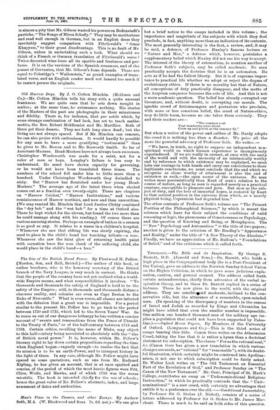Old Harrow Days. By J. G. Cotton Minchin. (Methuen and
Co.)—Mr. Cotton Minchin tells his story with a quite unusual frankness. We are quite sure that he sets down naught in malice ; at the same time, he extenuates nothing. His stories of the Masters of the past are photographs in their minuteness and fidelity. There is, for instance, that par nobile which, by some strange combination of bad luck, has set to teach mathe- matics, the Rev. Robert Middlemist and Mr. Marillier. Both of these get their deserts. They are both long since dead ; but the living are not always spared. But if Mr. Minchin can censure, he can also praise with enthusiasm. It would hardly be possible for any man to have a more gratifying "testimonial" than he gives to Mr. Bowen and to Mr. Bosworth Smith. So far of Assistant-Masters. Head-Masters have not always been successes. Christopher Wordsworth was made for a saint, not for a ruler of men or boys. Longley's failure is less easy to understand. He must have shown capacity for governing, or he would not have been translated three times. The numbers of the school fell under him to little more than a hundred. Under Christopher Wordsworth they dwindled to sixty. But " Harrow has flourished under her young Head- Masters." The average age of the latest three when elected comes out as a fraction over twenty-eight. There are chapters on " Harrow Cricket," " Harrow Institutions," and various reminiscences of Harrow worthies, and now and then unworthies. (We may remind Mr. Minchin that Lord Justice Chitty combined the " dry bob " and the " wet bob " for a time at Oxford also. There he kept wicket for the eleven, but found the two more than he could manage along with his reading.) Of course there are various amusing stories. Perhaps an example of bathos in a sermon is as good as any. It relates to a nurse in a children's hospital. " Whenever she saw that ebbing life was slowly expiring, she used to place in the child's hand her touching tribute—a rose. Whenever she saw the faint glow of returning health paint with carnation hues the wan cheek of the suffering child, she would place in the child's hand—a bun."


















































 Previous page
Previous page